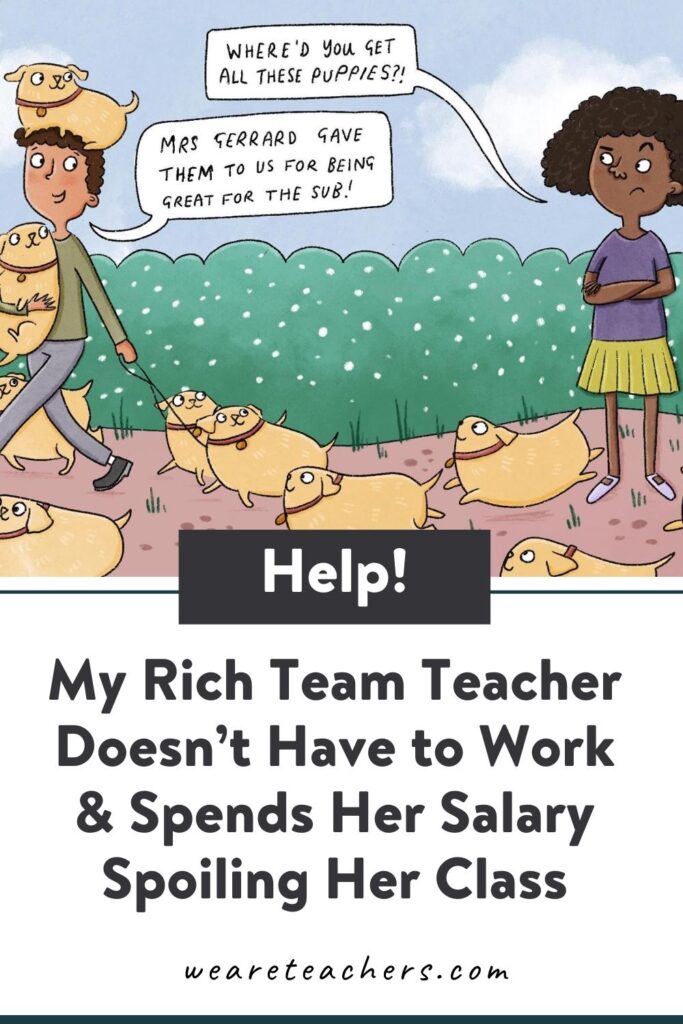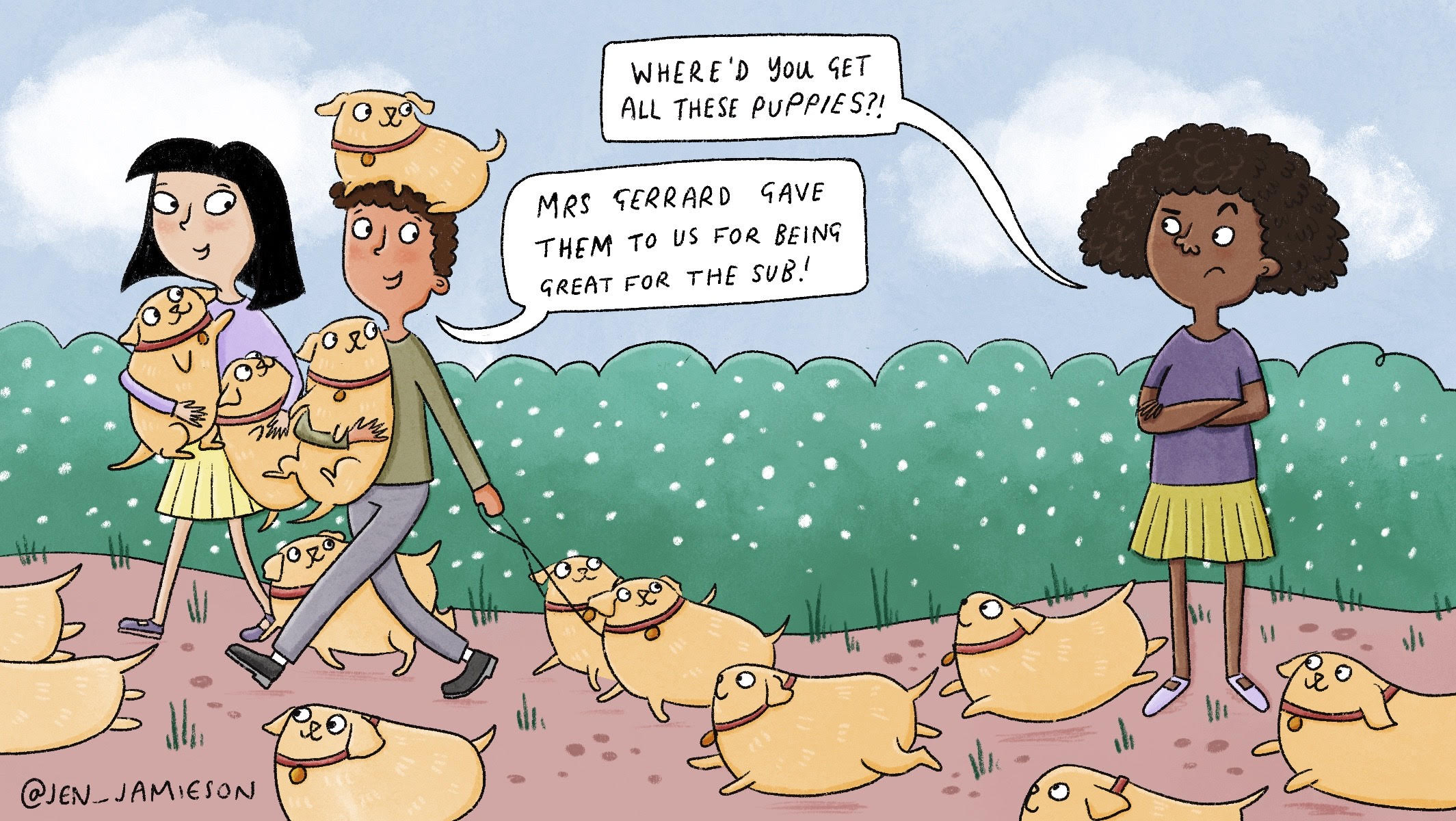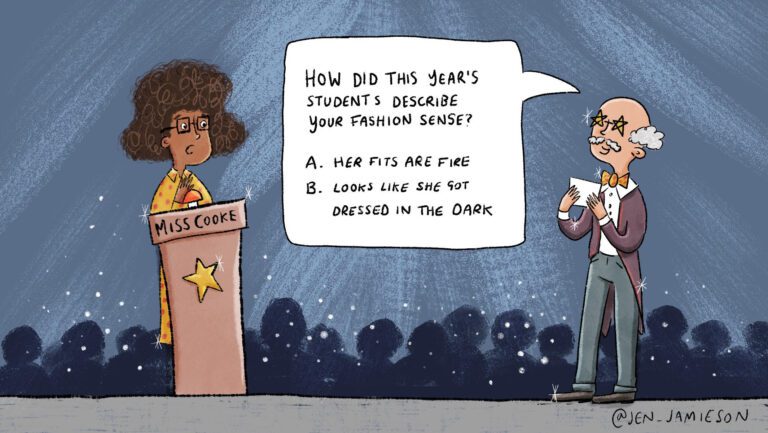Dear WeAreTeachers:
My teammate teacher doesn’t HAVE to work. Teaching is legit her hobby. She spends most, if not all, of the money she makes on her class. She buys all her students extravagant gifts and she even orders DoorDash/pizza almost weekly. Now I’m not saying she isn’t a great teacher. She does generally love her job, but it’s exhausting being her teammate. I’m a single parent having to tutor and work the aftercare program to be able to make ends meet. And yet her class has a pizza party every Friday. I can tell it bothers my students that they don’t get matching shirts to wear, special lunches, and expensive gifts. I feel like I’m not good enough sometimes. —Can’t Buy Me Love
Dear C.B.M.L.,
It’s super common for us to fall into the trap of comparison in our personal and professional contexts. You are working hard to provide for your family and also showing up for your students day in and day out. Your worth is not based on what your team partner does or doesn’t do. And your team partner’s materialistic approach sounds pretty extreme. Behavior has meaning and maybe this teacher feels somewhat insecure with the substantive, complex aspects of teaching. Showering students with gifts might make this teacher likable to the kids, but stuff isn’t what makes a great teacher. Can you hear the students saying over and over, “What do I get?”
Take a few moments to think about your favorite educators throughout the seasons of your life. What made them effective and memorable for you? I’m willing to say that your favorite teachers most likely sparked your curiosity and wonder, encouraged you to engage in self-reflection and build meaningful, compassionate relationships, value multiple perspectives, boost your confidence socially and academically, and communicate more effectively. Yes, you may remember a pizza party here and there, but I’m sure the enduring memories are more about how you felt and what you learned.
So what’s the problem with the focus on extrinsic rewards and materialism? It may seem harmless, but as Adela Schicker writes, “Unfortunately, extrinsic motivation can also lead to the erosion of enjoyment in tasks that were previously intrinsically pleasing. For instance, the overjustification effect shows that giving excessive external rewards can reduce intrinsic motivation.” Teachers who focus on gifting, prizes, and rewards can have the unintended consequence of overshadowing the more subtle joys of learning and progress.
We’ve all seen the temporary spike in emotions when showered with gifts. The thing is, it doesn’t have long-lasting effects. “This won’t come as a surprise to anyone tracking the science of happiness, which suggests that material things are unlikely to boost our happiness in a sustained or meaningful way. In fact, research suggests that materialistic people are less happy than their peers. They experience fewer positive emotions, are less satisfied with life, and suffer higher levels of anxiety, depression, and substance abuse.” So, your students may swoon over the stuff, but who you are as a person impacts them more than what you buy.
Focusing on what you CAN control is so easy to say and much harder to put into consistent practice. Let’s try to stay in your lane by focusing on family, your well-being, strong relationships with your students, and being prepared with your planning and instruction. I’d argue that your team partner is diminishing the role of teachers as professionals, and if you have the energy and courage, try a conversation with a trusted leader at your site to share what you are noticing and feeling.
Dear WeAreTeachers:
My end-of-the-year party had pudding and Sprite. And I know it went against the rules, but I figured it was OK for the last day. Mind you, the admin has rewarded attendance with Popsicles before. I guess one of my kids blabbed or something, but the admin found out. When it was time for dismissal, suddenly our interventionist is at my door telling me he was taking my kids to the gate. And he shared that my principal and AP are coming to talk to me. I didn’t get to wave goodbye to my students, hug them, or let parents grab pictures with me. Instead, I got sat down in my classroom and handed a written warning for violating the policy. What advice do you have? —Timing Is Everything
Dear T.I.E.,
Happy summer to you! I hope that you are finding ways to recharge. The end of the school year is always so full of activities and emotions. I’m sure that you aren’t the only teacher to celebrate this exciting time with some sweet treats. The thing is timing really does matter. You should have been the one walking your kids out to the gate, and I’m sorry you had to experience that jolting feeling of having the warmth, gratitude, relief, and connection dimmed. Even though it was frustrating and surprising to miss the final goodbyes, I hope you know that your impact supersedes and endures this type of snafu.
Let your principal know that it was upsetting to miss walking your kids out for dismissal on the last day. We all know that relationships are the heart of teaching!
Schools are full of hypocrisy. The principal who passes out Popsicles and then disciplines you for having a small treat on the last day is a good example of that. The counseling organization Straight Talk explains that “Everyone has been prone to hypocrisy at one point or another. It’s virtually impossible to live up entirely to one’s own moral code, as we are all humans that make mistakes. We may sincerely believe in objective morality, but find ourselves making excuses when it comes to our shortcomings.”
So, yes, we all make mistakes and this sweet treat is a minor one. And maybe your principal thinks that their reward is worthy and your end-of-the-year party isn’t.
It’s understandable that schools have gotten more strict with food over the years. In some spaces, food is used as extrinsic motivation frequently. I used to cringe knowing that every birthday celebration and reward party was centered around junk food. My daughters were eating pizza, chips, and cupcakes at school several times a month. There are so many people that have eating restrictions (including my kids), and inevitably some students are left out because of health issues. That can feel awful to a student. Although some teachers do arrange for alternatives, it often feels wonky for the kids.
I tried to rally parents of elementary-school-age kids to spend money on beautiful read-aloud books instead of processed foods but it never got traction. Imagine a birthday celebration where the child gifts a favorite book to the class and has a special seat up front while the teacher reads. The bookplate inside could have a meaningful dedication to the child and the classroom library would be full of these personal treasures too.
Dear WeAreTeachers:
My principal just met with me one-on-one and shared the news that they think it’s time for me to try a grade-level change. They even said that the sixth-grade team will benefit greatly from having me. The truth is I’m so nervous about my grade-level change from kindergarten to sixth grade. I have loved being with the younger ones, even though it can be draining to model so much and break down the tasks into digestible chunks. Sixth-grade math feels super intimidating and I’m worried the kids won’t relate to me or like me. I’m also insecure that they are moving me because they think I didn’t do a good enough job. Should I move schools or give sixth grade a try? —Sixth Grade Scares Me
Dear S.G.S.M.,
Grade changes can bring up so many mixed emotions! It’s normal to feel a little wobbly right now. And trust that what you know and what you do well with the younger students will also help you in a sixth-grade classroom setting. Your teacher’s presence, intentional planning, instruction, progress monitoring, and establishing a caring classroom community are important in any grade you teach.
So many educators feel a level of trepidation about working with older students. Often people think that sixth graders lack motivation or interest in school. That may be the case in some situations, AND we still have the power to create an inviting, welcoming, engaging classroom culture. I say give sixth grade a try. Either way, you are going to have some extra work whether you choose a new grade level or a new school.
Try not to take the grade-level change as a negative. Principals are often working on building more effective team dynamics based on teachers’ strengths. Yes, sixth grade is often the first year of middle school and is brimming with changes and challenges of all kinds. But you can do this! Your grade-level team can help you transition and get organized for the complex concepts, especially in math. Be honest with your principal and let them know you’d appreciate some on-the-clock planning and collaboration time with your team.
Your sixth graders will appreciate having choice, independence, and responsibility. Consider taking the kids outside for meaningful, relevant, and hands-on learning experiences. Richard Louv has authored several books about the role of nature for kids in building a meaningful life. Infusing “Vitamin N (Nature)” with your students can really promote motivation and inspiration.
Your older students need support and guidance as they grow up too. Dive in and enjoy the deep connections and concepts you can experience together. The WeAreTeachers community put together some excellent sixth-grade resources to boost your confidence and excitement about this big transition time.
Do you have a burning question? Email us at askweareteachers@weareteachers.com.
Dear WeAreTeachers:
I just finished up my first year of teaching and am officially on summer break. I’ve noticed that any time my husband is reminded of the fact that I won’t be working for the next three months, it really gets under his skin. He’s never said anything actually rude or picked any fights with me about it but just makes comments here and there. “It’s getting late … well, I guess that doesn’t matter for you anymore,” etc. I feel that it’s more of a jealousy thing, being that he does not like his job at all and his salary is less than mine. I think that it’s hard to accept that I get this “perk” along with a higher salary. So how do I remedy this situation?
Want more advice columns? Visit our Ask WeAreTeachers hub.


